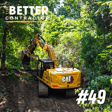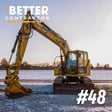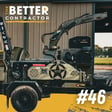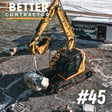Introduction to Q&A Session with Noah
00:00:14
Speaker
Welcome back to another edition of The Better Contractor. So today we're going to do a Q and&A style podcast. So I've got my wonderful dude, Noah, who's always here by the way. You just don't see him on camera, but he is here. so He's going to ask the questions and I'm going to do the answers. But, uh, so this is another one of those podcasts will be a little bit geared towards just kind of field related questions, um, that are basically sent in, but Noah, what is question one?
Case Study: Equipment Care and Repair Costs
00:00:43
Speaker
Yes. so for First question I got for it is how can I get employees and coworkers to take better care of the equipment? So funny enough, you asked that today. I haven't even talked to you about this yet, but so we use a system where, um,
00:00:59
Speaker
Basically bills get sent through and you have to approve it online. So today I was getting ready to approve some bills. Certain ones come across my desk, certain ones come across other people's desks. But anyway, $17,000 bill today for a John Deere 5101 tractor. I'm like, dang, that's a big bill for one tractor.
00:01:20
Speaker
So anyway, did some questions, found out that basically there was some issues, um, from our equipment manager. Uh, anyway, I'll leave some of that out. Big bill, one piece of equipment is all I will say. So how to improve that. And this is something we all battle ourselves included.
Ensuring Equipment Accountability Through Training
00:01:40
Speaker
So I'm not going to say I am the expert on this, but, um, I think I know a little bit about it. So.
00:01:46
Speaker
One of the first things I would say would to do would be to assign equipment and actually keep it assigned. And that is hard, especially in certain industries. So like our industry where crews are going every different direction in multiple different states. It's easy. As long as stuff doesn't break down and some stuff doesn't happen. When stuff breaks down, you got to keep a job going. There is some shifting that has to be done. But as long as you know who has it, it is assigned.
00:02:12
Speaker
And if there is some sort of way to where at the end of that project, or if it has to get moved, that there's a form that is filled out that says, Hey, this is the condition of this piece of equipment. When I took back control of it, or I took over for it, or when it left my possession, that is important. Um, and then having an assistant to hold accountable. So do you fire for certain things? Do you demote? Is there some kind of penalty? And this is not for wear and tear items. This is for obviously great big, you know, expensive, uh,
00:02:43
Speaker
things where someone just completely cowboyed up and get a job done or whatever that may be, there needs to be some accountability and some penis penalization that happens. Number two on that one, more training up front. So, you know, use a system like the Better Contractor or something in-house, but don't just turn over a hundred, 200, $300,000 piece of equipment to someone who says, yeah, I've done that before. Actually have a system of training, you know, whether it's online, hopefully it's a combination of a few things, but some online basic training,
00:03:13
Speaker
Hopefully you have a person, four person or a safety director, someone who can verify that that person does indeed know how to actually run that piece of equipment, do so safely and do so with a little bit of care for your equipment.
Maintaining Accountability: Expectations and Discipline
00:03:28
Speaker
Um, three, I put wrote down setting expectations high and hold accountable kind of goes back to number one. I think, you know, as a four person or manager leader, whatever your position is,
00:03:42
Speaker
you've got to set some sort of standard, then you got to hold accountable and holding accountable goes back to that disciplinary program. So do you have a disciplinary program at all? If the answer is no, you need to create one um because that is going to be, and from a legal standpoint, you should have one in you anyway, because what works and what you do for person A needs to be what you do for person B. You don't want a standard here and a different standard here that'll open you up to all kinds of legal issues.
00:04:09
Speaker
But the point is you need to have a ah system, a disciplinary program where they know, hey, I got X amount of points for this mishap that was totally preventable. If I get X amount more points, that results in a demotion, that results in a pay freeze, or that results in termination. There needs to be some sort of program there for that.
Cost-Saving Strategies: Audits and Terminations
00:04:27
Speaker
And last, i i had two more things. Perform infield audits. I would definitely be doing that. So the infield audit is something that hopefully a four person is maybe giving you feedback in the field and saying, hey, this person you hired, this person that's an operator, they are awesome. Or, hey, they're they're great at this. They're not so good at this. They're are they ah rough on equipment. They're going through stuff. They're doing stuff that they should not be doing. You need that feedback from that person. But I would also have, whether it's a safety director or someone in the field who is also going out there and verifying, hey, this crew is safe. Number one, these guys know how to operate equipment. Number two,
00:05:08
Speaker
And number three, they're actually maintenance in the equipment like they say every day. So I think those audits are extremely important. Last point, fire faster. So if you've got someone who's not cutting it, who does disciplinary programming, and all these different things you're doing is not working, they need to remove them because they are costing you a lot of money. So hopefully that helps, Noah. Yeah. Question number two.
Scope of Work: Detailing and Contingencies
00:05:35
Speaker
How can I improve the accuracy of my bid? That's a tough one, so especially depending on what industry you're in. um First, I would say remove as many of the unknowns as possible. It'd be super detailed in the scope of work. So I've seen a lot of scopes of work where they come through and they're very vague. And we've even talked about this with TBC, so for our scope of work for marketing.
00:05:59
Speaker
But we try to be very, very concise, actually list a number, list a deadline, like be as specific as possible. And what you're doing there is removing as much of that vagueness and unknowns as possible, because what you don't want to do is have the customer come to you and say, Oh, well, I thought you were also going to do this. So you want to go back to that scope of work and be able to say that scope of work should kind of be your Bible, essentially. That should be how we're going to perform this project. And if it's not listed,
00:06:25
Speaker
then there also probably needs to be some detergent conditions that if something is not listed, that could be added on for X amount of dollars or as a change order to the project. But you'll want to remove as many the unknowns as possible. um For our line of work, another thing I would say, add a line item for weird stuff, weather, breakdowns, unknown
Bid Reviews: Spreadsheets, Job Site Visits, and Team Experience
00:06:49
Speaker
surprises. I can think of multiple times over the years where that line item was not large enough, especially in like the spring. And all of a sudden you have like the, what is urine record in a project that was bid for 40 days, become 60 and you're working 20 days for free. So add that line item, the percent, we do it as a percent now. Um, but whatever industry you're in, contracting industry you're in, I would have a line item for it. Cause it's going to happen. There's going to be stuff happened that you just like, shoot, I did not think about that one.
00:07:20
Speaker
I can't think of any projects. It's like it gets to the end and you're like, yeah, everything went exactly as we planned. That's rare. So have that line item. him um Make spreadsheets your friend would be another one, I would say. So basically what that means is know your overhead and know your cost. So Atlanta Corp, our accountant is big on this. He licensed me spreadsheets and I actually have enjoyed or learned to love spreadsheets over time. So, but he's big on,
00:07:49
Speaker
knowing where everything goes. And that's something I wish I'd had that accountant in the very first few years of owning Lanarkorp, because I didn't know exactly where all my costs were going. i I didn't have the time to go through and do what he does. So what so if you're not doing that, though, a lot of people will go into a bid and think, oh, I've got labor and I've got materials and I've got equipment, I've got insurance. So they'll bid those things in. Truth is, there's probably a lot more overhead than just that.
00:08:18
Speaker
So you got to make sure all that stuff is accounted for in your bid. um So no good cost. um Visit the job site. So I'm going to take this into a personal thing. The jobs where I've lost the most money on were jobs where we had a bunch of bids due at one time. And we look at them like, oh, but we can't send someone or estimators to all of them. This project here looks easy enough to bid remotely, virtually.
00:08:46
Speaker
Those are the ones that seem to have gotten me the most over the years. So view your job site, get the photos, get the measurements. Do not bid at site unseen. Or if you do, and you absolutely have to, then have a bunch of terms and conditions in legal language to get you out.
00:09:01
Speaker
um Have someone experienced, but I've seen some companies, you know, utilize someone who may not have done that exact scope of work and they end up missing some details.
00:09:14
Speaker
and what was a 10-day project becomes a 12-day, a 14-day, a 20-day project. So you'll want someone who has had experience, who's been there in the field that actually knows, hey, this is what you look for in these job sites, or this is something that, hey, I had this happen five years ago, or crossing this creek will require building a temporary bridge. That takes us as much time or this much material. Those kind of one-off things. So that experience matters a lot.
00:09:41
Speaker
um Trying to think, oh, the other thing we've started doing a lot more the last few years is have multiple eyes look at it. So like I go back to the early years, when I first started the business, I was the bidder estimator and finalizer. so's once set ofised So So by just having one set of eyes, you kind of lose some of that debate and hey, will this work? Will that work? It's just actually achievable. Now we have multiple sets of eyes look at every bid and what that's doing is hopefully someone is second guessing what you're assuming.
00:10:12
Speaker
in making you think more about it. Hopefully that second, third, fourth set of eyes is seeing something in the bid that's like, ah, that hillside. So this is for our our our line of work. That hillside cannot be done with equipment. It has to be done by hand. Well, that completely changes your production rates. So having multiple sets of eyes What I like to do is, you know, right before that bid is submitted, you're going in, you're maybe sitting down in a conference room or whatever. You're putting everything out of the table. You're doing that final review to make sure those production, you know, ah goals can actually be met. The crew size is right. All the equipment is listed. Materials are listed. That kind of sit down at the very end before you hit submit. To me, that is super, super valuable.
Contract Terms: Maintaining Relationships
00:10:54
Speaker
Finally, this is just legally legal stuff.
00:10:57
Speaker
I see a lot of contractors do what I call handshake agreements or very simple one-page documents that they just send off. I would have terms and conditions for when you've messed up or not even just yourself, but basically in terms and conditions for if the customer changes stuff, there's going to be things that happen. Our terms and conditions is long now, ah longer than I even really want it to be, but it's things that we've learned over the years that, hey, that needs to be in there.
00:11:26
Speaker
So to me, a contract in terms of conditions, some people view them poorly. To me, that is good business. It is setting stuff up in a black and white way so that you and your customer have a document that says exactly this is what we will do for this exact price. If this deviates or variates from it, then this is what we will do.
00:11:44
Speaker
This is, this is the procedure. This is how that is handled. So to me, your scope, your contract, your terms and conditions should actually be a document that actually helps you guys maintain a good relationship and help that contract go smoothly. So today we're just doing two questions.
Conclusion: Call to Action and Co-Host Teaser
00:12:01
Speaker
Uh, hopefully you found those interesting and helpful. If you did, please share, please subscribe. Um, hopefully as the next podcast, we get the professor back on. We let you know.
00:12:11
Speaker
You missed Travis, the professor. I missed that guy. I think we're like episode six without him now. So he did message me the other night. I want to know if he still has a job. And I said, yes. So we will get him back on. I promise, guys. Probably read a lot of books. He's probably read like 12, 14 books by now, I'd say. So anyway, thank you for listening. If you guys liked it, please share it. Hopefully this is good for some of you guys in the field as well. So thank you. See you next time.




















